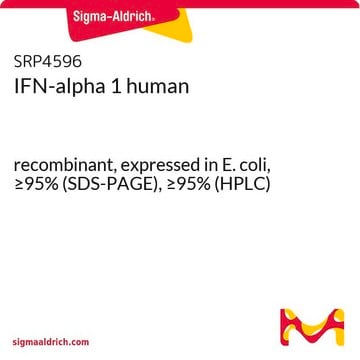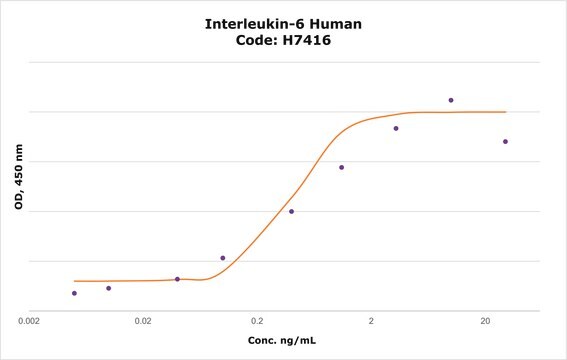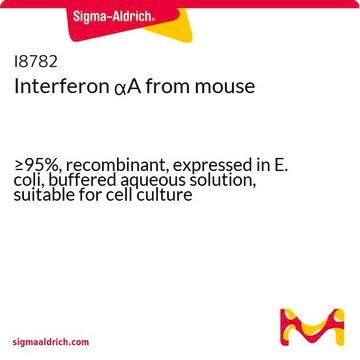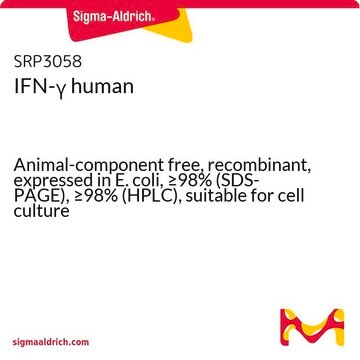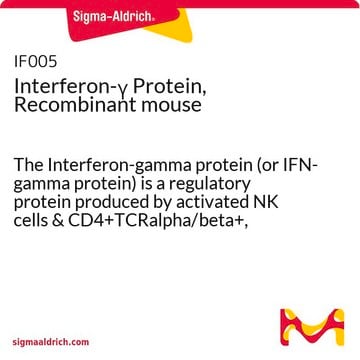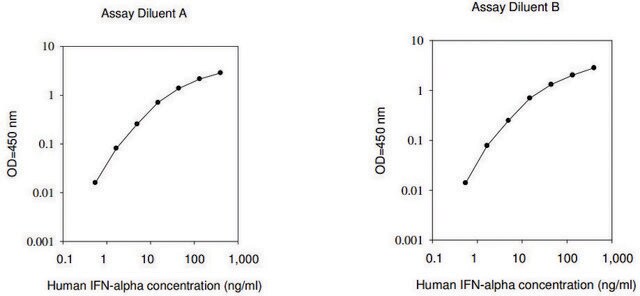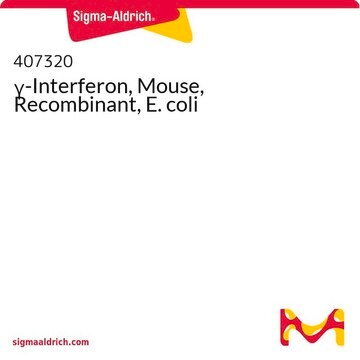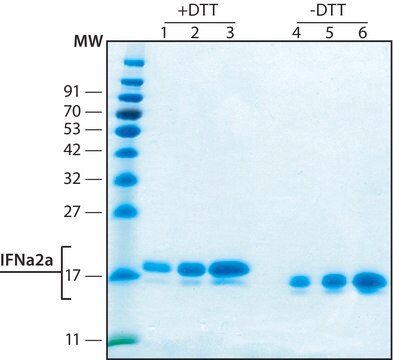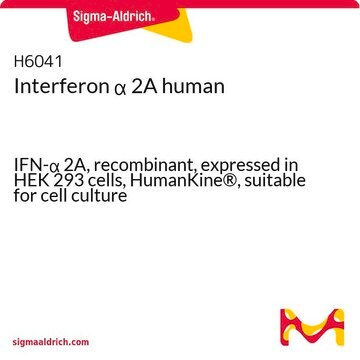I9032
Interferon β from mouse
≥95%, recombinant, expressed in E. coli, buffered aqueous solution, suitable for cell culture
Synonym(s):
IFN β
Sign Into View Organizational & Contract Pricing
All Photos(1)
About This Item
Recommended Products
biological source
mouse
Quality Level
recombinant
expressed in E. coli
Assay
≥95%
form
buffered aqueous solution
mol wt
~20 kDa
packaging
pkg of 1 vial
concentration
2560000 units/mL
technique(s)
cell culture | mammalian: suitable
UniProt accession no.
shipped in
dry ice
storage temp.
−70°C
Gene Information
mouse ... Ifnb1(15977)
General description
IFN β (interferon β) is from the type 1 interferon family of cytokines.
Interferon β (IFN-β) possesses a signal peptide region. It has comparatively more hydrophobic residues and displays 30% homology with IFN-α.
The gene encoding interferon β (Infb1) is localized on mouse chromosome 4.
Application
Interferon β from mouse has been used:
- in the stimulation of bone marrow-derived dendritic cells (BMDCs)
- as a cytokine to stimulate differentiation of podocytes
- to stimulate splenocytes
Interferon ß from mouse has been used:
- to induce the activation of cholesterol 25-hydroxylase, by in vitro stimulation of bone marrow-derived macrophages, dendritic cells and CD11c+ lung macrophages
- to stimulate splenocytes, in order to study the secretion and regulation of IFN-γ
- to intranasally pre-treat neonatal mice, to study its effects on the protective actions of Lactobacillus rhamnosus GG (LGG)
- as a standard to treat MEF-Mx2-luc-BKO reporter cell line for IFN-β measurement, in response to human adenovirus-5 (HAdV-C5)
Biochem/physiol Actions
In presence of virus infection, IFN β (interferon β) is upregulated and plays a crucial role in innate antiviral response. It is also important for anti-inflammatory effects.
Interferon β (IFN-β) suppresses a variety of proinflammatory cytokines in lymphocytes including the interleukin 1β (IL-1β) and tumor necrosis factor α (TNF-α). It also favors the synthesis of antagonists associated with interleukin IL-10 and IL-1 receptor. IFN-β downregulates interferon γ production but enhances transforming growth factor β1 expression. It has therapeutic potential in treating rheumatoid arthritis and relapsing-remitting multiple sclerosis (MS).
Interferon β has a role in the activation of human leukocyte antigen (HLA) gene expression. It acts as a messenger during bacterial infections.
Cytokine with anti-viral, anti-proliferative, immunoregulatory, and proinflammatory activities.
Physical form
Solution in 20 mM HEPES, pH 6.0, 0.5 M NaCl, 6% glycerol, and 0.1% bovine serum albumin.
Analysis Note
The biological activity is determined in the cytopathic effect inhibition assay using mouse L929 cells with encephalomyocarditis virus. The cytopathic effect of 50% is produced with approximately 1 unit/ml interferon. The units are determined with respect to NIH international standard reference for mouse interferon β.
Storage Class Code
10 - Combustible liquids
WGK
WGK 1
Flash Point(F)
Not applicable
Flash Point(C)
Not applicable
Personal Protective Equipment
dust mask type N95 (US), Eyeshields, Gloves
Certificates of Analysis (COA)
Search for Certificates of Analysis (COA) by entering the products Lot/Batch Number. Lot and Batch Numbers can be found on a product’s label following the words ‘Lot’ or ‘Batch’.
Already Own This Product?
Find documentation for the products that you have recently purchased in the Document Library.
Customers Also Viewed
Leesa M Pennell et al.
Immunology, 152(3), 439-450 (2017-06-25)
CD11c+ dendritic cells (DCs) exert a critical role as antigen-presenting cells in regulating pathogenic T cells in multiple sclerosis (MS). To determine whether the therapeutic benefit of interferon-β (IFN-β) treatment for MS is in part influenced by IFN regulation of
Interferon-beta: Structure, differential actions, and medical applications
Revel, Michel
Growth Factors and Cytokines in Health and Disease, 2, 433-520 (1997)
Judith van Holten et al.
Arthritis research & therapy, 6(3), R239-R249 (2004-05-15)
We investigated the therapeutic potential and mechanism of action of IFN-beta protein for the treatment of rheumatoid arthritis (RA). Collagen-induced arthritis was induced in DBA/1 mice. At the first clinical sign of disease, mice were given daily injections of recombinant
Vasco Marcato et al.
Molecular and cellular biology, 36(1), 13-29 (2015-10-16)
Rapid upregulation of interferon beta (IFN-β) expression following virus infection is essential to set up an efficient innate antiviral response. Biological roles related to the antiviral and immune response have also been associated with the constitutive production of IFN-β in
Patrick Ejlerskov et al.
Cell, 163(2), 324-339 (2015-10-10)
Neurodegenerative diseases have been linked to inflammation, but whether altered immunomodulation plays a causative role in neurodegeneration is not clear. We show that lack of cytokine interferon-β (IFN-β) signaling causes spontaneous neurodegeneration in the absence of neurodegenerative disease-causing mutant proteins.
Our team of scientists has experience in all areas of research including Life Science, Material Science, Chemical Synthesis, Chromatography, Analytical and many others.
Contact Technical Service
